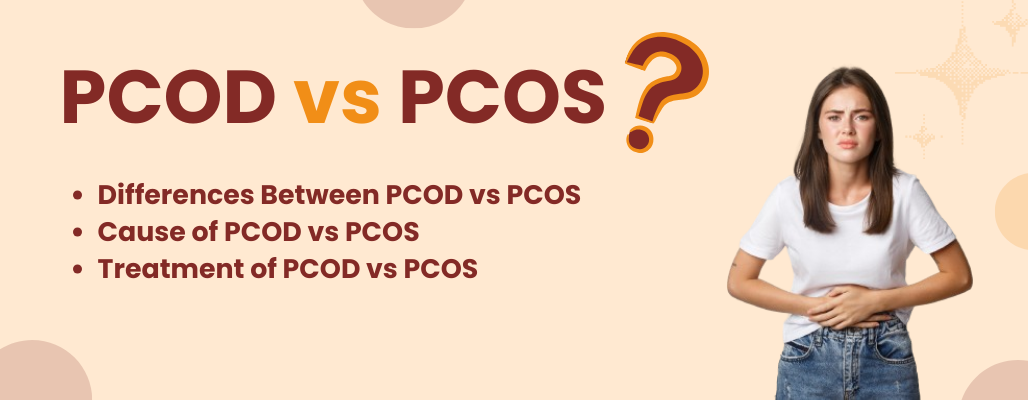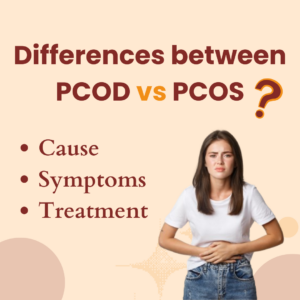- 95555 44421 / 22 / 23 / 28
- [email protected]
- Mon – Sat: 09:00 – 19:00

Are PCOD and PCOS the same? A lot of women confuse the two concepts, especially when talking about how they relate to pregnancy. These illnesses are unique, despite many similarities, like their connection to hormonal imbalances and the ovaries. Let’s see PCOS vs PCOD.
What is PCOD?
Every woman normally has two ovaries, each of which releases an egg once a month. Small levels of androgens, or male hormones, are also produced by these organs. The condition known as PCOD (Polycystic Ovarian Disease) is brought on by the ovaries releasing large numbers of partly or underdeveloped eggs that eventually turn into cysts.
PCOD frequently leads to enlarged ovaries that overproduce androgens. This has a negative impact on fertility and general health.
What is PCOS?
In individuals with PCOS (Polycystic Ovary Syndrome), there is an overproduction of androgens by the ovaries, disrupting the development and release of eggs. Some of these eggs may develop into cysts, small sacs filled with fluid. Rather than being released during ovulation, these cysts accumulate in the ovaries and can sometimes enlarge.
As now we have learnt what PCOS and PCOD are. Lets see the symptoms you will be facing if you suffer from any of the two ailments. Dig down to know about them.
The symptoms of the two conditions often coexist and vary from person to person. Infertility, weight gain, hirsutism, acne, and irregular menstruation are common signs associated with PCOD. Similar symptoms may also include PCOS and, if left untreated for an extended period of time, diabetes, cardiovascular risks, and other issues like exhaustion, hopelessness, and anxiety.
Both disorders have the potential to be severe if they are not managed properly and constantly monitored by a doctor or other healthcare professional.

The exact cause of PCOS is still a mystery. Among the possible contributing elements are:
Insulin resistance: The pancreas produces the hormone insulin, which allows cells to use sugar as the body’s main energy source. Blood sugar levels may rise if cells develop resistance to the actions of insulin, which would cause the body to overproduce insulin.
Low-grade inflammation: Low-grade inflammation is caused by molecules that white blood cells create in reaction to damage or infection. Studies show that PCOS patients have low-grade chronic inflammation, which causes their polycystic ovaries to overproduce androgens. Inflammation of the heart and circulatory system may be a factor.
Genetics: Research indicates that there might be a genetic component to PCOS. Those who have a family history of PCOS may be more likely to develop the illness.
Overproduction of androgen: The ovaries may produce an excessive amount of androgen. Excess of androgen can interfere with regular ovulation. This also prevents the follicles’ ability to mature. It also halts the release of eggs. Elevated testosterone levels can also cause acne.
Understanding PCOS vs PCOD is very necessary. This will ease your diagnosis and treatment plan. Keep reading to know about it
The goal of PCOS treatment is to target the particular issues that are bothering you. These could include obesity, hirsutism, acne, or infertility. Medication or changes in lifestyle may be part of customized treatment plans.
Lifestyle Adjustments:
Your doctor may advise reducing weight by eating a low-calorie diet. Or you can do so by engaging in moderate physical activity. A small weight loss of, say, five percent of your overall body weight, could help.
Medicinal Interventions:
Your healthcare practitioner may suggest the following to control menstrual cycles:
Techniques for hair removal: Long-term hair removal options include laser hair removal and electrolysis. To destroy a hair follicle, electrolysis involves putting a tiny needle inside each one and sending an electric current through it.
Acne treatments: A variety of drugs, such as oral tablets and topical gels or lotions, can reduce acne. Consult your healthcare provider to explore suitable options.
To sum up, defining the differences between PCOD and PCOS highlights the minor differences. These common hormonal illnesses that impact women. Although PCOD is mainly associated with multiple tiny cysts on the ovaries. PCOS includes a broader range of symptoms, such as irregular menstruation, high testosterone, and ovarian cysts. Understanding PCOS vs PCOD is essential for accurate diagnosis. Also this can help in effective treatment of both conditions.
PCOS is a significant disorder, whereas PCOD is not classified as a disease. Because PCOD can be managed with proper diet and exercise. PCOS, however, is characterized as a metabolic disorder.
PCOS is an endocrine system disorder. While PCOD stems from hormonal imbalances. Hormonal imbalances and genetic factors are factors responsible for it. Additionally, insulin resistance and inflammation have been associated with excessive androgen production.
PCOD is more prevalent. It is affecting almost one-third of women globally. On the other hand, Polycystic Ovary Syndrome has a lower incidence rate.
Polycystic Ovarian Disease does not necessarily lead to infertility. It should not be viewed as a barrier to pregnancy. In approximately 80 percent of cases, women with PCOD can conceive with minimal assistance. And can have a smooth pregnancy experience.
| LOCATION | Check Pages for Complete Information |
| Delhi | Best IVF Centre in Delhi |
| Noida | Best IVF Centre in Noida |
| Pilibhit | Best IVF Centre in Pilibhit |
| Nawanshahr | Best IVF Centre in Nawanshahr |
| Lucknow | Best IVF Centre in Lucknow |
| Hanumangarh | Best IVF Centre in Hanumangarh |
| Rohtak | Best IVF Centre in Rohtak |
| Nepal | Best IVF Centre in Nepal |
| Bareilly | Best IVF Centre in Bareilly |
| Jaipur | Best IVF Centre in Jaipur |
